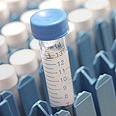
The new regulations will likely restrict fertility treatments funded by the State as part of the "health basket" to women under the age of 45. Women aged 45 to 54 will be eligible for a state-subsidized egg donation, due to IVF's low success rate among older women.
In addition, women aged 42-44 will only be entitled to three state-funded treatments. The number of treatments for all women will be limited, and after six treatments which fail to result in pregnancy a committee will debate whether to allow the woman to continue the process.
The reason for the change is the high costs spent by the State on fertility treatments for women aged 45. Ministry figures reveal that while the cost of the treatments stands at some NIS 1 million (about $280,000) per woman, the success rate stands at just 2%.
Egg donation has higher success rates
Israel has been topping the global chart of fertility treatments for years, but studies conducted recently revealed that success rates drop significantly with age. According to the data, a woman up to the age of 35 has a 28% chance of achieving a pregnancy in each treatment cycle, while a woman over the age of 45 has a chance of just 0.1%.
The problem is not just the multiple, painful and exhausting treatments, but also the significant cost to the Israeli taxpayer. Up to the age of 35, fertility treatments leading to childbirth can cost up to NIS 60,000 ($17,000), while the cost for a woman over the age of 45 reaches some NIS 1 million, with most treatments failing to result in pregnancy.
These figures have led the Health Ministry to discuss limiting state-subsidized fertility treatments up to the age of 44. Above this age, women will be given the option to receive an egg donation from another woman, a process which has proved to be faster and have a much higher success rate, as well as a relatively low cost for the State.
Prof. Martha Direnfeld, chairwoman of the Israeli Fertility Association, together with the Israeli Society of Obstetrics and Gynecology, initiated the document of recommendations submitted to the health minister and Health Ministry director-general.
"The number of IVF treatment cycles in proportion to the population in Israel is the highest in the world," says Direnfeld, "but the clinical results are not as good as what is acceptable in the world, due to the high number of treatments conducted here with a very low chance of success to begin with.
"Our aim is to shift the huge cost of fertility treatments for women over the age of 45 to the funding of an egg donation, so that even women who reach the age of 39, instead of undergoing so many treatment cycles and futile examinations, will be able to receive an egg donation which holds a very high chance of resulting in pregnancy."
The Health Ministry said in a statement that the health minister and director-general would discuss the recommendations soon. According to estimates, they are expected to limit the funding of IVF treatments in favor of egg donations in accordance with the recommendations.
Number of treatments doubled
According to Health Ministry figures, the number of IVF treatment cycles has doubled, from 18,000 in 2000 to 38,284 in 2011. Some 20 in 1,000 women up to the age of 49 underwent fertility treatments that year, an 80% increase compared to 2000, when only 11.5 in 1,000 women underwent such treatments.
The successful childbirth rate has shown as certain increase, yet most treatment cycles fail: Compared to a 2.5% success rate in 1997, in 2009-2011 4.1% of all treatment cycles resulted in the birth of a living baby.
The number of treatment cycles which included an embryo replacement (in other words, the in-vitro fertilization resulted in the formation of an embryo) rose to 33,066 in 2011 compared to 16,230 in 2000.
The number of fertility treatments resulting in pregnancy went up to 8,796 in 2011 compared to 8,123 the previous year and 4,217 in 2000 – a 7% increase from the previous year, a 36% increase from 2005 and a 66% increase from 2000. About one-quarter of treatment cycles resulted in pregnancy, a relatively stable percentage in the past decade.
Overall, some 6,900 babies were born in 2011 as a result of in-vitro fertilization, compared to 3,546 in 2000.















